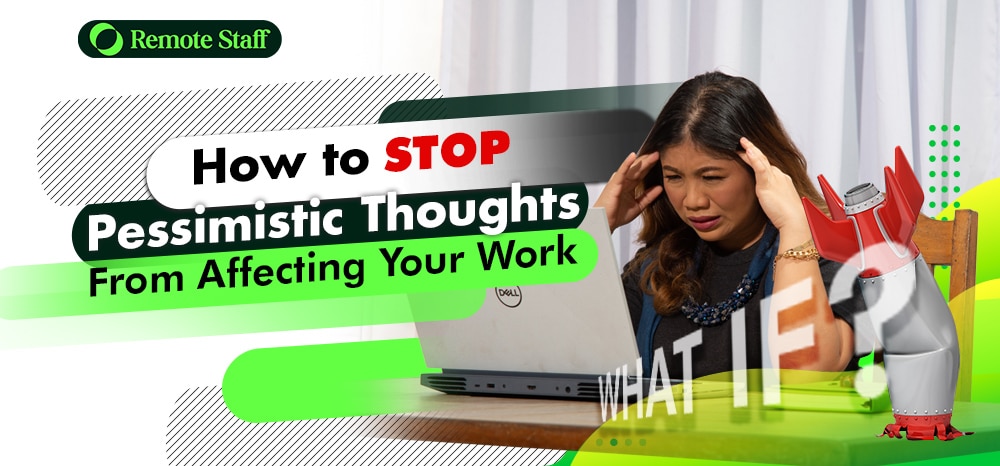Asking what-if questions is a natural process we all do every day. It helps us make better decisions, either at work or outside it. Some common examples of what-if questions include: “What if I can’t pay my bills this month?” and “What if I don’t get the position I applied to?”
However, anything in excess isn’t good. Worrying too much about what-if questions can lead to anxiety, with grave consequences for your physical and mental health.
To help you avoid this, here are some tips you can follow to stop what-if thoughts from affecting your online work from home. With these, you can find a balance between living with your what-if thoughts and avoiding the detrimental effects of anxiety.

Ask Yourself: “Will Worrying About Your What-if Thoughts Solve Anything?”
There’s a big difference between worrying about what happened or will happen and doing something about it. The problem with focusing too much on what-ifs is that our brains often highlight the worst scenarios. So instead of motivating you to solve it, you become mired in anxiety and despair.
Thus, one way to stop what-if thoughts is to ask: “Will worrying about it help you in any way?” Of course, you will answer no, but that sometimes won’t stop you from worrying. So provide evidence to your brain by recalling events where you faced a similar situation and emerged triumphant.
Alternatively, you can recall events where the worst-case scenario happened, yet you survived and recovered from it. We all fail sometimes; that’s just a fact of life. What matters more is whether we get up and try again or stay where we are.

Take Steps to Solve the Problem.
Another question you should ask yourself to stop what-if thoughts is: “Can I do anything to mitigate the source of my what-if questions?” If you answer “no,” then worrying is useless. As much as it hurts to say, the only thing you can do is accept this situation and move on.
If you say yes, then focus on what you can do right now and what you can do in the future. For example, your mind kept asking: “What if there’s a sudden power outage in my area during work hours?”
In this case, it would be wise to buy a pocket wifi unit. If you can afford it, you can also get a laptop as a back-up to your desktop computer so you can continue working despite the power interruption.

Consider Relaxation Exercises.
When your anxious thoughts feel overwhelming, engaging in relaxation exercises is a great way to reduce anxiety and stop what-if thoughts. These exercises enable your body to rest and calm down in stressful situations.
Examples of relaxation exercises include meditation, yoga or tai chi, listening to music, and breathing exercises. If you’re religious, you could also try saying a quick prayer between breath exercises to help you calm down.
Initially, you won’t see much difference between practicing relaxation exercises and not doing so when your what-if thoughts invade your mind. But just like working out, with enough practice, you’ll be able to quickly regain your composure when faced with your anxieties.

Identify the Cause of Your What-if Thoughts.
Like anything else, your what-if thoughts don’t pop out of nowhere, despite what we may sometimes think. These thoughts come from somewhere, and knowing where they came from considerably aids in helping you stop them.
To help you identify the source of your anxieties, here are some questions you should ask yourself:
- What current event in my life has caused me to start thinking what-if thoughts?
- How do I feel regarding this situation?
- Is there something that’s making me feel unsafe in this situation?

Don’t Be Afraid to Get Help.
If your thoughts become too hard to manage alone, it doesn’t hurt to ask for help. A common problem when dealing with mental health in the Philippines is the fear of being judged by others for seeking therapy. This mindset only worsens things, as this fear adds to your existing ones, preventing you from getting any better.
But the thing is, there’s nothing to be embarrassed about getting help for your condition. Do you feel embarrassed when you get medicine for a cold or fever? Then why should you feel ashamed for doing so for a mental ailment?
Seeking the assistance from a mental health professional for your problem can help you overcome your anxieties through therapy and medication. Here, you can learn relaxation and thinking techniques that can help you calm down and reduce your worries.

Don’t Let What-ifs Dictate Your Life.
Even though it’s a natural part of our minds to ponder what-if questions, it can be overwhelming and detrimental. You get hung up on thinking about them too much, and you won’t be able to function normally anymore.
But worry not, you can always try any of the tips above to stop what-if thoughts and reduce your anxiety.
If one of your pressing what-if questions is: “What if I can’t find a job today?” Fret not; Remote Staff has you covered. We constantly update our list of available positions whenever a new client makes a request. Good luck!

